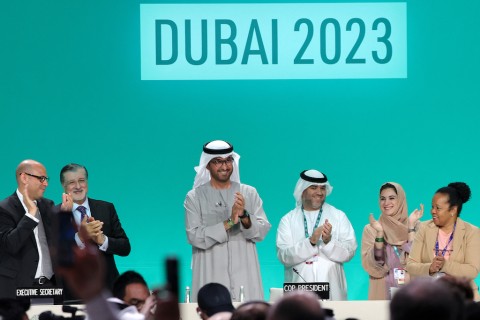
DUBAI - Nearly 200 nations meeting in Dubai approved a first-ever call for the world to transition away from fossil fuels, the top culprit of climate change behind a planetary crisis.
After 13 days of talks and another sleepless night in a country built on oil wealth, the Emirati leadership of the COP28 summit banged a gavel to signal the world had reached consensus.
"You did step up, you showed flexibility, you put common interest ahead of self-interest," said COP28 president Sultan Al Jaber, whose role as head of the United Arab Emirates' national oil company raised suspicion among many environmentalists.
The United Arab Emirates, he said, was "rightly proud" of its role in bringing "transformational change" to the planet.
"The world needed to find a new way. And by following our North Star, we have found that new path," he said to applause, referring to the goal of limiting warming to 1.5 degrees Celsius.
Danish negotiator Dan Jorgensen, part of a group in charge of making headway, called the agreement "historic progress".
The text, however, stopped short of calls during the summit for a "phase-out" of oil, gas and coal, which together account for around three-quarters of the emissions responsible for the planetary crisis.
Low-lying islands fear extinction from rising sea levels and worsening storms, with the Marshall Islands denouncing the earlier draft as a "death warrant".
The bloc of small island states called the revised text "an improvement" but it reiterated concerns, saying that the deal was "incremental and not transformational".
The biggest-ever COP meeting hosted more than 88,000 people, including a record number of lobbyists from the fossil fuel industry.
The 2015 Paris summit endorsed checking warming at 1.5C -- a goal repeated in the latest draft, but which critics say is virtually impossible without serious efforts to curb oil, gas and coal.

